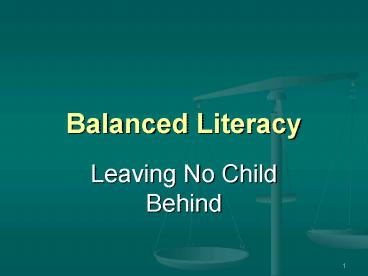Balanced Literacy - PowerPoint PPT Presentation
1 / 18
Title:
Balanced Literacy
Description:
Reading to, with, by children every day. Spelling and writing activities every day ... Different activities can spring from these reading activities based on abilities ... – PowerPoint PPT presentation
Number of Views:71
Avg rating:3.0/5.0
Title: Balanced Literacy
1
Balanced Literacy
- Leaving No Child Behind
2
Balanced Literacy
- Appropriate Assessment
- Flexible Grouping
- Reading Practice
3
Appropriate Assessment
- DSA can be first step in knowing which other
assessments to use - Keep in mind the developmental nature of reading
- Dont spend time on assessments for which child
is not ready - Dont give assessments that you dont plan to use
to base instruction
4
Appropriate Assessment The Developmental Nature
of Reading
- Concepts of Print
- Phonemic Awareness
- Alphabetic Principle/Alphabet Recognition
- Phonics/word recognition/ decoding/ spelling
- Vocabulary
- Fluency/Comprehension
5
Appropriate AssessmentThe Developmental Spelling
Analysis can
- Be group administered
- Provide an assessment of individual strengths
- Assist in determining which other assessments are
appropriate - Assist in grouping children for instruction
6
Appropriate AssessmentThe Developmental Spelling
Analysis cannot
- Always determine individual reading abilities
because spelling can be lower than reading - Pinpoint specific weaknesses in Concepts of Print
and Phonemic Awareness
7
Appropriate AssessmentThe Running Record
- Must know reading level of passage used
- Use to determine childs fluency (wcpm)
- Use to determine each childs independent,
instructional, and frustration level
8
Appropriate AssessmentThe Running Record
- Independent level (95-100 accuracy) is for
guided practice with teacher - Instructional level (90-94 accuracy) is for
buddy reading or SSR - Frustration level (below 90 accuracy) should be
reserved for whole group or shared reading
9
Appropriate Assessment
- Frequent assessments,such as running records (for
fluency and accuracy) and different forms of the
DSA, can help determine appropriate ongoing
instruction - Once assessments have been administered, children
can then be grouped by reading and spelling
abilities for beneficial individualized
instruction
10
(No Transcript)
11
(No Transcript)
12
(No Transcript)
13
Flexible Grouping
- Whole group learning--reading to children
- Heterogeneous Grouping (mixed abilities)--reading
by children - Homogeneous Grouping (similar abilities)--reading
with and by children
14
Literacy Instruction withFlexible Grouping
- Can/should include whole group and homogeneous
activities every day - Heterogeneous grouping can be for special
occasions, themes, interests, activities - Reading to, with, by children every daySpelling
and writing activities every day
15
Whole Group Learning--Reading to Children
- Teacher planned and directed or student interests
- Guest readers
- Shared reading (teacher/Big Book)
- Content area reading
- Theme-related
- Skills that all can learn can be pointed out
- Different activities can spring from these
reading activities based on abilities/interests
16
Heterogeneous Grouping--Reading by Children
- Groups are divided so there is always a strong
reader - Cooperative learning activities
- May be content or theme-related
- Groups may change with each activity
17
Homogeneous Grouping--Reading With and By
Children
- Groups are organized by ability, need, and
sometimes, interest - Lower reading groups should meet every day
- Higher reading groups can meet less often or in
literature circles without constant teacher
assistance
18
Homogeneous Grouping--Reading With and By Children
- Children should be reading at levels no harder
than instructional level - Guided reading (teacher assisted/leveled text)
- Buddy reading/repeated reading
- Personal reading (SSR)
- Along with tape
- Choral reading/echo reading































